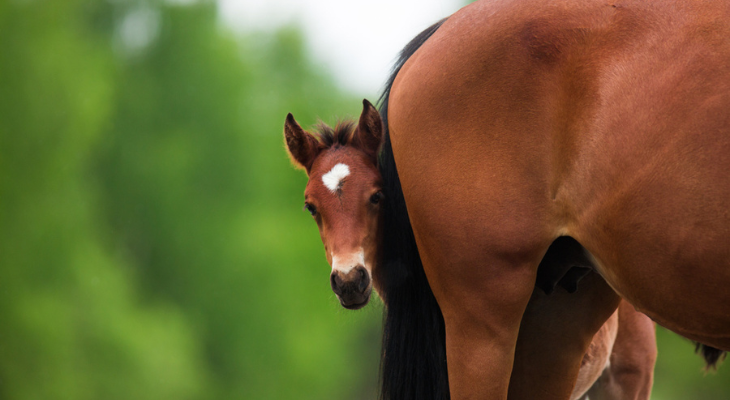
The Facts About Foal Nutrition
Giving your foal the best possible start in life begins with good nutrition. Although all of your foal's nutritional needs are initially met by milk from the mare, the newest addition to your stable will soon need to transition to solid food. Following a few key nutrition guidelines will help you keep your foal healthy.
Nursing Is Essential to Your Horse's Growth and Health
Mare's milk nourishes your foal and helps protect it from illness. Colostrum, the first milk produced after the foal is born, contains antibodies, proteins that find and attack germs. This natural immune system booster reduces the foal's risk of illness until its immune system becomes stronger.
During the first one to three months, foals should nurse 7 to 10 times per hour, according to The Horse. Nursing is usually accomplished in short spurts. If you notice that the foal nurses for extended periods, it may not be getting enough milk. If this happens, you may need to provide a milk replacement to supplement the amount of milk received through nursing.
Other signs that could mean the foal isn't receiving enough milk include:
- Lethargy (Foals should be active and curious.)
- Constant Suckling
- Not Sleeping Between Feedings
- Failure to Gain Weight
Weaning Requires a Thoughtful Approach
Weaning may take place as early as four months, which is just about a month after the mare's milk production decreases. Gradual weaning ensures that the foal gets adequate nutrition during this important time. Slowly increasing the amount of forage and feed the foal eats will decrease its dependence on milk. Introducing forage and feed that continues the nutrients growing foals need can begin as early as 8 to 10 weeks.
The American Academy of Equine Practitioners (AAEP) notes that foals should initially eat one pound of feed per age in months. Feed should be divided into several portions provided throughout the day rather than provided in one large meal. Once nursing stops, a 500- to 600-pound foal should eat 2 to 3% of its weight in feed and forage, according to the AAEP.
Foals should be encouraged to spend time in the pasture if possible. In addition to helping bones and muscles become stronger, turnout gives your horse access to fresh forage. Although protein-rich forage contains many of the nutrients your foal needs for good health, some supplements may be necessary. Foals that don't spend a lot of time in the pasture may benefit from vitamin A and fatty acid supplementation.
If you buy hay, it's a good idea to have it tested to determine if it's lacking any key nutrients. In addition to protein, foals need lysine, amino acids, selenium, copper, zinc, phosphorous and calcium, as well as an assortment of vitamins, including vitamins A, D, C and E.
Grains May Not Be the Best Choice While Your Foal Is Growing
Wondering if you should feed your foal grains? According to Equine Wellness Magazine, grains and legumes can cause blood sugar swings and raise a horse's cortisol level. Grains also ferment quickly, which may make it more difficult to digest grasses.
Feeding grains in addition to hay could also cause the foal to gain weight too quickly. Rapid weight gain can be a factor in orthopedic diseases that could weaken the foal's bones and lead to lifelong health issues.
Do you have a few questions about foal nutrition or need to schedule an appointment with the equine veterinarian? Give us a call and let us know how we can help.
Sources:
American Association of Equine Practitioners: Foal Growth: Special Care and Nutrition
https://aaep.org/horsehealth/foal-growth-special-care-and-nutrition
The Horse: Get Foal Nutrition Right From the Start, 2/10/2023
https://thehorse.com/17359/get-foal-nutrition-right-from-the-start/
Horse Journals: Developmental Orthopedic Disease in Foals, 11/18/2022
https://www.horsejournals.com/horse-care/feed-nutrition/developmental-orthopedic-disease-foals
Equine Wellness: Support Your Foal’s Weaning Process with the Right Diet, 5/31/2019
https://equinewellnessmagazine.com/foals-weaning-diet/
The Horse: A Sensible Start: Feeding Young Horses from Foaling to Weaning, 7/16/2021
https://thehorse.com/170166/a-sensible-start-feeding-young-horses-from-foaling-to-weaning/



